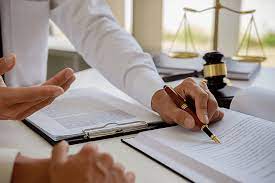When to Hire a Dispute Resolution Attorney and Why It Matters
Conflicts are the regrettable but unavoidable reality of conducting business. It could be a dispute with a supplier, a violation of an agreement by a partner, or a failure in communication with a customer, but conflicts can get out of hand rapidly if they are not addressed appropriately. The dilemma many company owners and individuals have is: when do you call in lawyers, and when is too soon?
This guide will take you through crucial times when having the right legal expert on board will safeguard your interests, save you stress, and prevent you from making expensive errors.
Early Signs You Shouldn’t Ignore
Most individuals wait for a dispute to boil before they approach a lawyer for help. At that point, financial and reputational damage could already have been sustained. The fact is, the sooner you consult, the better your chances are of resolving the matter effectively.
Some common early warning signs include:
- Repeated missed deadlines or non-compliance by the other party
- Confusion or disputes over contract terms
- Sudden breakdowns in communication
- Threats of legal action
- Accusations of non-performance or breach
If any of these red flags appear, consulting a legal expert can help assess your situation and explore your options before things spiral.
Why Waiting Can Cost You
Delaying legal action often leads to unnecessary escalation. You may lose valuable evidence, miss critical deadlines, or agree to terms that disadvantage you legally. Time-sensitive issues such as those involving employment disputes, unpaid invoices, or intellectual property can especially benefit from early legal insight.
An experienced Dispute Resolution Attorney can not only provide clarity on your legal position but also help you prepare the strongest case should litigation or arbitration become necessary.
Not Every Dispute Requires Court
One of the biggest misconceptions about legal conflicts is that they must go to court. In reality, there are several effective alternatives such as negotiation, mediation, and arbitration that can resolve matters privately and efficiently.
The key is understanding your options. A good attorney can explain what path is most suitable for your case based on the facts, your priorities, and the nature of the dispute. In some cases, a well-drafted legal letter or structured dialogue between parties may resolve issues without further escalation.
The Importance of Timing and Professional Support
Bringing in legal support early is not just about preparing for conflict, it’s about making smarter decisions from the outset. A well-timed consultation can help you understand your risks, protect your position, and even avoid disputes altogether through strong contractual agreements or strategic negotiation.
This is especially important when large sums, cross-border issues, or sensitive reputations are at stake. It’s better to have preventative legal advice than face corrective action when matters have already gone wrong.
When to Engage a Law Firm
There are key moments when you should seriously consider involving a professional legal partner. These include:
- When informal discussions are going nowhere
- If the other party has brought in legal representation
- When you’re unclear about your rights or obligations
- If legal deadlines or court procedures are approaching
- When preserving evidence becomes crucial to your position
Engaging a Law Firm at this stage ensures that your interests are protected, your documentation is aligned, and your strategy is sound whether resolution is pursued inside or outside of court.
Prevention Is Still the Best Strategy
While dispute resolution is essential, prevention is just as valuable. Working with legal advisors before issues arise helps reduce your exposure to risk. This includes drafting clear agreements, performing legal audits, and ensuring compliance with applicable laws and regulations.
Many businesses build long-term relationships with legal experts to navigate everything from contract negotiations to employee matters. When conflicts do arise, the transition into resolution is smoother and less disruptive.
What to Expect From Your Legal Advisor
A strong dispute resolution lawyer does more than respond to issues; they guide you through options with strategy and foresight. Here’s what a well-rounded legal advisor should offer:
- Realistic assessment of your case’s strengths and weaknesses
- Clear explanation of possible resolution paths
- Support in gathering and preserving essential documentation
- Negotiation skills to avoid unnecessary escalation
- Representation in court or arbitration, if required
More importantly, your lawyer should align with your values and desired outcomes whether that’s preserving a relationship, protecting your reputation, or asserting your rights.
Final Thoughts
Disputes don’t have to derail your business or peace of mind. Knowing when to involve a legal expert can make all the difference between escalation and resolution. The earlier you take action, the more options you’ll have and the better positioned you’ll be to protect what matters most.
Whether through negotiation, mediation, or litigation, sound legal support empowers you to navigate challenges with clarity and confidence. Don’t wait until a disagreement becomes a full-blown crisis. Seek guidance, stay proactive, and invest in the right support at the right time.

